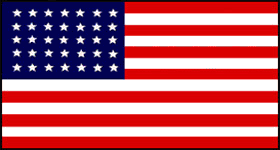 |
Civil War Battles |
|
State War Records |
| AL - AK - AZ - AR - CA - CO - CT - DE - FL - GA - HI - ID - IL - IN - IA - KS - KY - LA - MA - MD - ME - MI - MN - MS - MO - MT - NE - NV - NH - NJ - NM - NY - NC - ND - OH - OK - OR - PA - RI - SC - SD - TN - TX - UT - VT - VA - WA - WV - WI - WY |
The Battle of Marion
December 17-18, 1864 in Marion, Smyth County, Virginia
 |
|||||||||||||||||||||
|
Riding through the Cumberland Gap, Stoneman's expedition advanced on the important lead mines and salt ponds around Marion and Saltville. On December 17, Stoneman defeated a makeshift force of Confederate defenders.
On the 18th, the Federals destroyed the leadworks and mines. On the 20th, Stoneman then turned back to Saltville.
After determined skirmishing on the part of the outnumbered Confederate defenders, the Federals captured and destroyed the salt works, accomplishing the objective of their raid.
Though the battle at Marion was considered a Union victory, Breckinridge and his men had accomplished several things. The respect for the Confederate fighting abilities had convinced Stoneman to suspend his devastating raid and contributed to his inability to completely destroy the salt works. The vastly outnumbered Confederates had also inflicted heavy causalities on the Union army.
Breckinridge ordered his field officers to inspect the troops and to report back with the condition of his troops. The number of men wounded and killed had depleted his troops to a point that he judged that he could no longer hold back the Union forces at his front lines. Ammunition in the camp was also dwindling; each man had no more than ten cartridges apiece. With their supplies destroyed by Stoneman's troops at the towns of Wytheville and Abingdon, there was little hope of being resupplied or reinforced in the near future.
Although the vastly outnumbered Confederates had inflicted casualties and slowed the Union advance on Saltville, they were incapable of halting it. Finding their own path to Saltville's defenses blocked, Breckinridge and his men retreated further south, while a Union company advanced. Saltville fell to a night attack on December 20–21 and the salt works were destroyed by the Union forces.
Salt had always been in short supply in Virginia and after the destruction of the salt-mines became "practically nonexistent", giving Lee's sutlers "no means of preserving what little meat they could lay hands on ... for the hungry men in the trenches outside Petersburg and Richmond". Additionally, damage to the lead mines near Wytheville would keep them from contributing fully to the war effort for three months. Many wells and water sources were also fouled, leading to the disruption of water supplies. Many of the railroad locomotives, cars, depots, and bridges in the vicinity were destroyed beyond repair during Stoneman's campaign. In a memoir, Stoneman wrote that his troops captured 34 officers and 845 enlisted men during the attack into Marion, Virginia.
